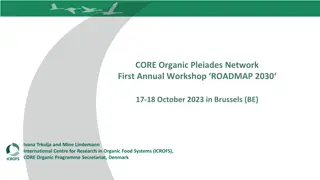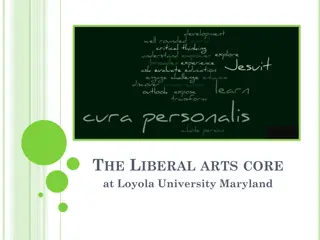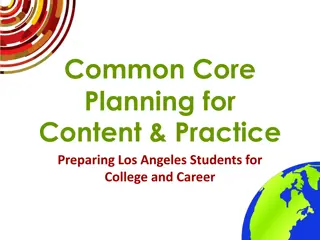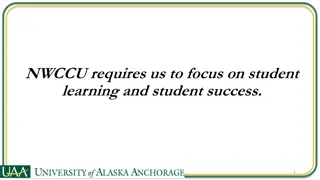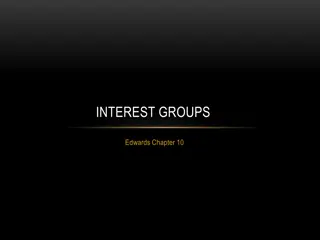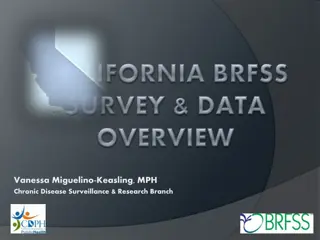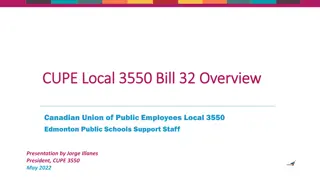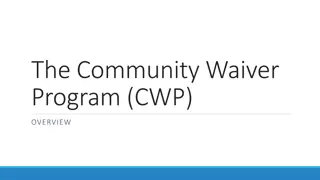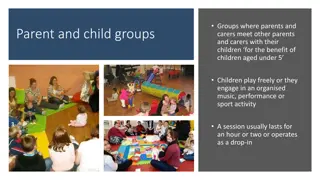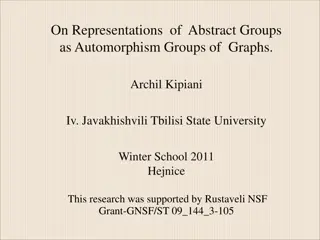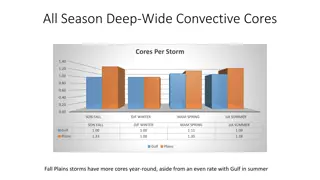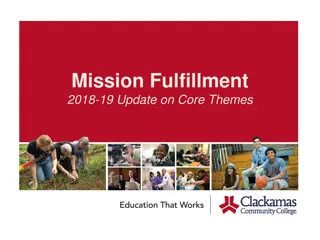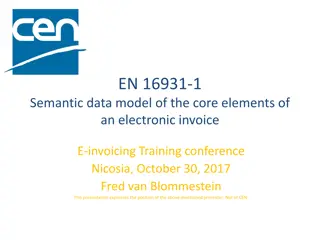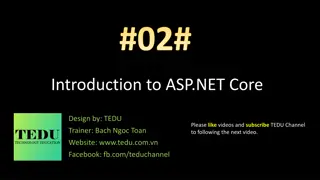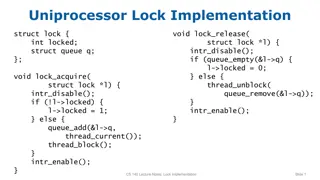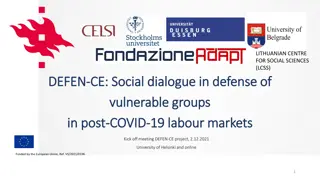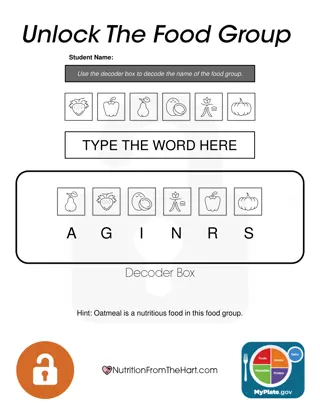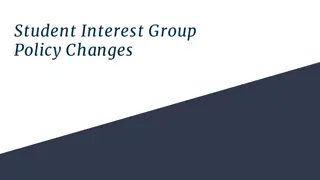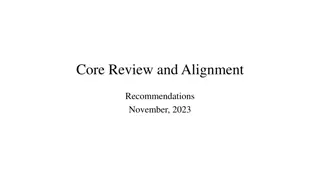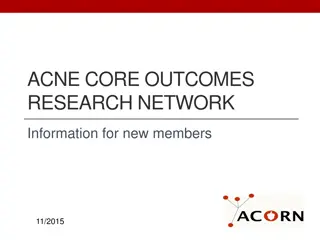Minnesota Core Volleyball Club - Empowering Athletes, Building Community
Discover the newly named Minnesota Core Volleyball Club focusing on core values, quality training, competitive tournaments, and a supportive environment. Join now and unlock your potential on the court!
1 views • 21 slides
Types of groups and reactions
This information discusses electron-donating groups (EDGs) and electron-withdrawing groups (EWGs), their effects on molecule reactivity, examples of each group, nucleophiles, and electrophiles. EDGs increase electron density, making nucleophiles stronger, while EWGs decrease electron density, making
0 views • 14 slides
Core Forum 2024: Call for Proposals
Core Forum 2024 invites submissions for presentations on key topics such as Access & Equity, Leadership & Management, Preservation, and more. The event aims to gather practitioners to share innovative projects and research. Submit your proposal to be part of this thought-provoking conference in Minn
1 views • 16 slides
Enhance Your Fitness Journey: Core Strength and Speed Workouts
Explore the importance of core strength in maintaining posture and physical performance, engage in a virtual group challenge to test your endurance with wall planks, and boost your core strength with a practical 7-minute workout. Transition into focusing on speed with insights into sprinting, cyclin
0 views • 38 slides
CORE Organic Pleiades Network First Annual Workshop Roadmap 2030 - Event Recap
The CORE Organic Pleiades Network held its first annual workshop in Brussels, focusing on organic research and innovation in the European agri-food sector. The event discussed HEU partnerships, national/regional action plans, research funding, and more. CORE Organic aims to enhance knowledge and inn
0 views • 37 slides
Understanding Terrestrial Planets and Core Dynamics
Exploring the core-mantle interaction from the early Hadean period to present times reveals intriguing questions about the outer core's electrical conductivity, geodynamo sustainability, and inner core characteristics. Studies indicate challenges in maintaining the geodynamo, potential heat sources
9 views • 48 slides
Class Groups Are They the Future of Collaborative Learning
The traditional classroom setting, with rows of students facing a teacher at the front, has dominated education for centuries. However, the rise of technology and the evolving needs of the 21st century workforce are pushing the boundaries of learning. Enter Class Groups, a concept that reimagines th
4 views • 3 slides
Loyola University Maryland Liberal Arts Core Overview
The Liberal Arts Core at Loyola University Maryland emphasizes a well-rounded education through courses in Humanities, Social Sciences, Mathematical Sciences, and Natural Sciences. Students take 15 core courses in liberal arts, including writing, history, literature, language, philosophy, theology,
2 views • 19 slides
Enhancing Common Core Aligned Math Lessons for Los Angeles Students
Plan and implement Common Core aligned problem-based math lessons using John Van de Walle's Three-Phase Structure to prepare Los Angeles students for college and career success. Explore strategies to cater to diverse learners such as English learners, Standard English learners, Students with Disabil
4 views • 23 slides
Understanding Functional Groups in Organic Chemistry
Functional groups in organic chemistry are specific groups of atoms within molecules that determine the chemical properties of the compound. This content provides visual representations and descriptions of various functional groups such as alkanes, alkenes, alcohols, aldehydes, acids, and esters. Le
0 views • 38 slides
Guideline for Statin Management in High-Risk Groups - 2018 ACC/AHA
This guideline outlines the management of blood cholesterol in high-risk groups according to the 2018 ACC/AHA recommendations. It discusses the overall approach, different statin management groups, justification for statin use in high-risk populations, high and moderate-intensity statin therapy, and
1 views • 14 slides
Focusing on Student Learning and Success in Higher Education
NWCCU emphasizes the importance of student learning outcomes and core competencies across programs to ensure student success. The institution engages stakeholders to develop meaningful, assessable, and aspirational core competencies relevant to students and communities. Through collaborative efforts
0 views • 9 slides
Understanding Interest Groups in Texas
Explore the role and influence of interest groups in Texas politics, including theories, types of groups, activities, and the impact of lobbying. Learn about incentives for joining, the free rider problem, and the various benefits interest groups offer. Discover the different types of interest group
0 views • 15 slides
Understanding the Role of Interest Groups in Politics
Interest groups are organizations with shared policy goals that influence the policy process. They differ from political parties as they focus on specific policies. Theories of interest group politics include pluralist, elite, and hyperpluralist perspectives. Hyperpluralism suggests that groups beco
0 views • 22 slides
Understanding Chemical Groups and Macromolecules in Biological Processes
In biological processes, certain chemical groups play crucial roles in molecular functions. These functional groups, including hydroxyl, carbonyl, carboxyl, amino, sulfhydryl, phosphate, and methyl, are essential for the structure and function of biological molecules. Additionally, macromolecules, s
0 views • 9 slides
Overview of BRFSS Survey and its Core Components
The Behavioral Risk Factor Surveillance System (BRFSS) is a state-based telephone survey that monitors personal health behaviors in non-institutionalized adults. It collaborates with the CDC and all 50 U.S. states to gather data on various health topics. The survey includes fixed core questions on d
0 views • 18 slides
Overview of CUPE Local 3550's Response to Anti-Union Legislation
A detailed overview of Bill 32, an anti-union legislation affecting Canadian Union of Public Employees (CUPE) Local 3550, which requires categorization of dues into core and non-core, with members opting in for non-core spending. The local has reviewed its budget, confirming it is 100% core, and emp
0 views • 14 slides
Overview of the Community Waiver Program (CWP) and Enrollment Groups
The Community Waiver Program (CWP) aims to support full participation in communities, preserve natural living arrangements, and reduce waiting lists by offering targeted services to different enrollment groups. The program includes three authorities: 1915(c) Waiver, 1915(i) State Plan Amendment, and
0 views • 58 slides
Recertification and Assessment of Core Curriculum Courses
The Core Curriculum Council of the Faculty Senate presents a process for recertification and assessment of core curriculum courses to maintain integrity and quality. Courses must be recertified every four years to ensure consistency amidst changes in instructors, content, and teaching methods. State
0 views • 33 slides
Guidelines for Parent and Child Groups Under 5 Years Old
Parent and child groups for children under 5 provide a space for families to connect while children play freely or participate in structured activities. Sessions last for an hour or two with a maximum of 30 attendees. Indoor singing is limited to 6 adults, with good ventilation, while outdoor singin
2 views • 5 slides
Enhancing Alignment Between Introductory Biology and Core Courses
Explore the alignment of the Biology core curriculum, focusing on the structure, goals, and rationale behind flipping portions of the curriculum. Evaluate the preparedness of students for core courses, identify gaps, redundancies, and essential knowledge transfer. Study design involves categorizing
0 views • 25 slides
Representation of Abstract Groups through Graphs
Explore the representation of abstract groups as automorphism groups of graphs, touching on topics such as the existence of graphs whose automorphism groups are isomorphic to given abstract groups, the cardinality of connected graphs satisfying specific properties, and questions regarding the cardin
0 views • 16 slides
Analysis of Seasonal Variations in Gulf Plains Convective Cores
The analysis reveals fascinating insights into Gulf Plains convective cores, showcasing variations in core numbers, average pixels per storm, pixels per core, and core sizes across different seasons. Deep-Wide cores dominate in the summer, while Gulf cores are larger in the fall. The study sheds lig
1 views • 4 slides
Practical Approach to Using Groups and Teams in Classroom Settings
This workshop focuses on utilizing groups and teams in educational environments, providing techniques to form diverse and effective groups, outlining key principles, exploring low and high-risk activities, discussing different forms of peer assessment, and addressing challenges associated with group
0 views • 27 slides
Insights into Labour and Birth Among Marginalized Groups and Migrant Women
This content discusses new insights into socio-cultural phenomena surrounding labour and birth, particularly focusing on marginalized groups and migrant women. It includes details on sub-working groups, updates, and plans within this topic area, such as experiences of labour and birth, optimizing ch
0 views • 22 slides
Understanding Organic Chemistry: Functional Groups and Naming Rules
Delve into the world of organic chemistry with a focus on functional groups like alcohols, ethers, aldehydes, and ketones. Explore the rules for naming these compounds, understanding their structures, and how they impact the properties of molecules. From alcohols with hydroxy groups to ketones conta
0 views • 21 slides
Achieving Mission Fulfillment Through Core Themes: An Update
In 2016, our college established four core themes to represent its mission at the core. These themes - Academic Transfer, Career & Technical Education, Essential Skills, and Lifelong Learning - serve as indicators to gauge our progress towards fulfilling our mission. Currently, we are performing abo
0 views • 18 slides
Semantic Data Model of Electronic Invoicing Core Elements
Presentation by Fred van Blommestein on the EN16931-1 semantic data model of core elements in electronic invoicing, covering invoice processes, core invoice design, semantic model details, business rules, and invoicing principles. The model includes 160 elements in 33 groups, with mandatory elements
0 views • 13 slides
Understanding Pressure Groups and Their Influence on Decision-Making
Pressure groups are formed by like-minded individuals to influence decision-makers by drawing attention to specific issues, with the aim of impacting legislation and existing laws. People join pressure groups seeking to address particular issues more effectively than through mainstream politics. Whi
0 views • 25 slides
Hierarchy of Housing Board and Covid-19 Response Groups
Focus on Covid-19 response with various groups established for coordination. Housing Board utilizes existing networks for input and feedback, encourages collaborative efforts among partners, and engages in consultations and projects. Addresses issues related to rough sleepers, vulnerable groups, and
0 views • 12 slides
Influence of Group and Culture on Human Personality Development
Society functions as a cohesive unit composed of smaller social groups that interact and shape individuals' psycho-social development. The difference between mechanical aggregates and psycho-social units lies in the emotional connections and responsibilities present in the latter. Groups like family
0 views • 8 slides
Understanding ASP.NET Core: Features, Ecosystem, and Differences
ASP.NET Core is a modern framework for building web applications with cross-platform capabilities. It offers a leaner and modular approach compared to ASP.NET Framework. With support for both .NET Core and full .NET Framework, ASP.NET Core enables developers to create applications that can run on Wi
0 views • 9 slides
Lock Implementation Strategies for Single-Core and Multi-Core Systems
The provided content outlines several lock implementation strategies for both single-core and multi-core systems. It covers the structures, functions, and techniques used to manage locks efficiently, including releasing locks, acquiring locks, and handling synchronization. Different versions of lock
0 views • 6 slides
Salafi Jihadi Threat from Afghanistan: Key Insights
The Salafi Jihadi groups in Afghanistan, including Al Qaeda Core and ISIS-K, pose a growing threat to U.S. security interests. These groups share the goal of establishing a global Caliphate through violent means. Al Qaeda Core is particularly focused on targeting the U.S. and aims to rebuild its cap
0 views • 22 slides
Social Dialogue in Defense of Vulnerable Groups in Post-COVID-19 Labour Markets
The Lithuanian Centre for Social Sciences (LCSS) is hosting the DEFEN-CE project kickoff meeting at the University of Helsinki, focusing on social dialogue in defense of vulnerable groups in post-COVID-19 labor markets. The project aims to explore the role of social dialogue in addressing employment
0 views • 33 slides
Decode the Food Groups Challenge
Test your knowledge of food groups by decoding the names of different food groups based on hints provided for each. Identify the food groups where nutritious foods like oatmeal, mango, yogurt, soy milk, nuts, and spinach belong. Challenge yourself to decipher the encoded words and improve your under
0 views • 5 slides
Student Interest Group Policy Changes Overview
Student Interest Group Policy Changes involve implementing new criteria for student interest groups, setting membership requirements for preclinical and clinical years, consolidating existing groups, and establishing new interest groups. The policy includes guidelines on events, fundraisers, faculty
0 views • 9 slides
Journey to the Earth's Layers
The Earth's structure consists of four main layers: the crust, mantle, outer core, and inner core. The crust is the thin, rocky layer we see on the surface, while the mantle is a solid layer that flows like a viscous liquid. The outer core is a hot, melted layer of iron and nickel, and the inner cor
0 views • 10 slides
Core Review and Alignment Committee Updates
The Core Review and Alignment Committee established in 2021 at WSU is diligently evaluating the existing core requirements, aligning them with learning outcomes, and addressing issues such as student transfers, distinctiveness of the core, and student recruitment and retention efforts.
0 views • 13 slides
ACORN Core Outcomes Research Network Overview
ACORN (ACNE CORE OUTCOMES RESEARCH NETWORK) was established in July 2013 with the aim of creating a standardized set of core outcome measures for use in acne clinical trials. Led by key individuals such as Diane Thiboutot, Jerry Tan, and Alison Layton, ACORN focuses on global representation, stakeho
0 views • 10 slides




